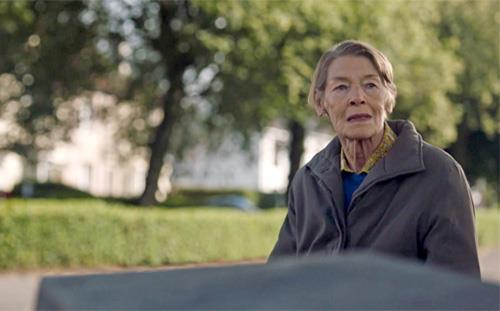
Watching Glenda Jackson (top) perform in anything constitutes a treat.
Watching Glenda Jackson perform in Elizabeth Is Missing, which airs Sunday at 9 p.m. ET in PBS’s Masterpiece series (check local listings), is also hard work.
Elizabeth Is Missing adapts Emma Healey’s well-received novel into a 90-minute movie, and while it’s not a one-woman show, Jackson dominates the production as elderly widow Maud Horsham.
Maud has Alzheimer’s, seemingly at a middle stage. She lives by herself, tenaciously clinging to independence as long as she can. To remind herself of routine tasks she would otherwise forget, she writes hundreds of Post-it notes.
She has a daughter, Helen (Helen Behan), who lives nearby and regularly comes by to visit and help out. Helen understands the situation and works hard not to show the exasperation that her mother’s behavior and demeanor often trigger.
Helen’s daughter Katy (Nell Williams) is as kind and supportive as a teenager can be expected to be, and between Helen and Katy, Maud has the best possible shot at keeping her life for as long as the cruel disease allows.
True to the book, Jackson doesn’t play Maud as a sweet-natured victim. She’s opinionated and often cranky. She has a short fuse and tends to snap at people who don’t see things the way she sees them.
She’s frustrated with the world and with Alzheimer’s, and since she’s also increasingly unfiltered, she often takes that frustration out on whoever is nearby.
Jackson’s heart-wrenching portrayal of an elderly person caught in this terrible situation, with a functioning body and a declining mind, so dominates Elizabeth Is Missing that the viewer can sometimes almost forget the story has another shorter-term plotline.
Maud seems to have one close friend her own age, Elizabeth (Maggie Steed). They get together and talk and work in Elizabeth’s garden.
One day Elizabeth doesn’t show up for a planned rendezvous, and Maud becomes obsessed with finding out why not. No one else seems nearly concerned enough for Maud, who becomes increasingly worried and focused as a couple of days go by.
To the credit of the story, Maud does not suddenly turn into a supersleuth who summons Sherlock Holmes-like powers to solve the mystery. She just peeks through the window of Elizabeth’s house and notices something out of place, leading to her beginning to imagine what might have happened.
What breaks the case, subtly at first, is Maud’s drifting into memories of her childhood, when her beloved and popular sister Sukey (Sophie Rundle) vanished. That was 70 years ago, and Sukey was never seen again.
Sukey’s and Elizabeth’s disappearances come together in Maud’s mind, and to the extent she can convey coherent and credible thoughts to Helen and others, a confluence starts to form.
There’s no miraculous happy ending in Elizabeth Is Missing. Maud is still progressing more deeply if slowly into the prison of Alzheimer’s, and those around her can do little except watch and tend to details of the moment.
A few things do get resolved, which is dramatically satisfying. But as masterfully as Jackson plays Maud Horsham, this is one dark and somber tale.